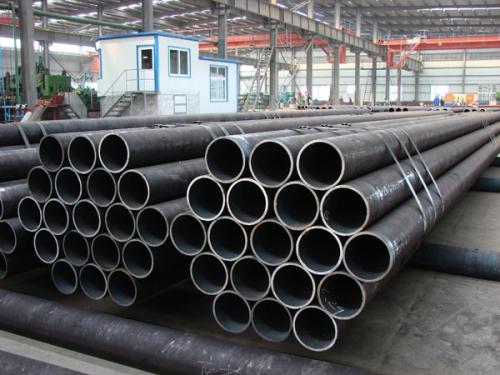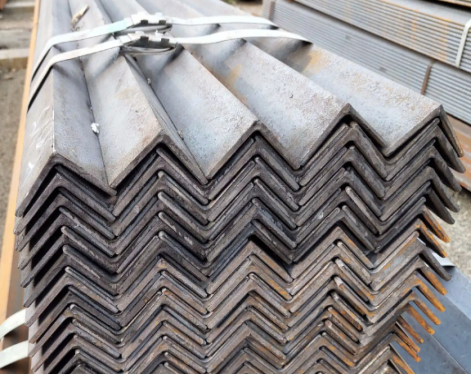The tensile test is to make a seamless pipe into a sample, pull the sample to fracture on a tensile testing machine, and then measure one or several mechanical properties. Usually only tensile strength, yield strength, elongation after fracture and reduction of area are measured. Tensile test is the most basic mechanical performance test method for metal materials. Almost all metal materials require tensile tests as long as they have requirements for mechanical properties. Especially for those materials whose shapes are not convenient for hardness testing, tensile testing has become the only means of testing mechanical properties.
The tensile test of seamless pipe is divided into four stages
(1) Elastic stage. At this stage, the deformation of the sample is completely elastic. After all the loads are written, the sample will return to its original length. In this stage, the elastic modulus E of the material can be determined.
(2) Condescending stage. The elongation of the specimen increases dramatically, while the load reading on the universal testing machine fluctuates within a small range (the jagged line in the figure). If the small fluctuations in the load readings are omitted, this stage can be represented by a horizontal line segment on the stretch diagram. If the sample is polished, you will see stripes on the surface of the sample that are about 45° from the drawing line, called slip lines
(3) Strengthening stage. After the sample reaches the yielding stage, if the seamless pipe is to continue to elongate, because the material is not strengthened during the deformation process, the resistance in the sample does not increase.
(4) Necking stage and breaking stage. After the sample is elongated to a certain level, the load readings gradually decrease instead. The seamless steel pipes that have passed the tensile test can be put into construction

Since the tensile test is not convenient for testing, and it is very convenient to convert from hardness to strength, more and more people only test the hardness of materials and seldom test their strength. Especially due to the continuous improvement and innovation of hardness tester manufacturing technology, some materials that could not directly test the hardness before, such as seamless steel pipes, stainless steel plates and stainless steel strips, etc., are now possible to directly test the hardness. Therefore, there is a tendency that the hardness test gradually replaces the tensile test.
The hardness test is to slowly press a hard indenter into the surface of the sample according to the specified conditions, and then test the depth or size of the indentation to determine the hardness of the material. Hardness test is the simplest, fastest and easiest method in material mechanical performance test. The hardness test is non-destructive, and there is an approximate conversion relationship between the material hardness value and the tensile strength value. The hardness value of the material can be converted into the tensile strength value, which has great practical significance.
For annealed seamless steel pipes with an inner diameter of more than 6.0 mm and a wall thickness of less than 13 mm, W-B75 Webster hardness tester can be used. It is very fast and easy to test, and is suitable for quick and non-destructive qualification inspection of seamless steel pipes. For seamless steel pipes with an inner diameter greater than 30mm and a wall thickness greater than 1.2mm, use a Rockwell hardness tester to test the hardness of HRB and HRC. For seamless steel pipes with an inner diameter greater than 30mm and a wall thickness less than 1.2mm, the surface Rockwell hardness tester is used to test the hardness of HRT or HRN. For seamless steel pipes with an inner diameter less than 0mm and greater than 4.8mm, use a special Rockwell hardness tester for pipes to test the hardness of HR15T. When the inner diameter of the seamless steel pipe is greater than 26mm, the hardness of the inner wall of the pipe can also be tested with a Rockwell or superficial Rockwell hardness tester.
The tensile test of seamless pipe is divided into four stages
(1) Elastic stage. At this stage, the deformation of the sample is completely elastic. After all the loads are written, the sample will return to its original length. In this stage, the elastic modulus E of the material can be determined.
(2) Condescending stage. The elongation of the specimen increases dramatically, while the load reading on the universal testing machine fluctuates within a small range (the jagged line in the figure). If the small fluctuations in the load readings are omitted, this stage can be represented by a horizontal line segment on the stretch diagram. If the sample is polished, you will see stripes on the surface of the sample that are about 45° from the drawing line, called slip lines
(3) Strengthening stage. After the sample reaches the yielding stage, if the seamless pipe is to continue to elongate, because the material is not strengthened during the deformation process, the resistance in the sample does not increase.
(4) Necking stage and breaking stage. After the sample is elongated to a certain level, the load readings gradually decrease instead. The seamless steel pipes that have passed the tensile test can be put into construction

Since the tensile test is not convenient for testing, and it is very convenient to convert from hardness to strength, more and more people only test the hardness of materials and seldom test their strength. Especially due to the continuous improvement and innovation of hardness tester manufacturing technology, some materials that could not directly test the hardness before, such as seamless steel pipes, stainless steel plates and stainless steel strips, etc., are now possible to directly test the hardness. Therefore, there is a tendency that the hardness test gradually replaces the tensile test.
The hardness test is to slowly press a hard indenter into the surface of the sample according to the specified conditions, and then test the depth or size of the indentation to determine the hardness of the material. Hardness test is the simplest, fastest and easiest method in material mechanical performance test. The hardness test is non-destructive, and there is an approximate conversion relationship between the material hardness value and the tensile strength value. The hardness value of the material can be converted into the tensile strength value, which has great practical significance.
For annealed seamless steel pipes with an inner diameter of more than 6.0 mm and a wall thickness of less than 13 mm, W-B75 Webster hardness tester can be used. It is very fast and easy to test, and is suitable for quick and non-destructive qualification inspection of seamless steel pipes. For seamless steel pipes with an inner diameter greater than 30mm and a wall thickness greater than 1.2mm, use a Rockwell hardness tester to test the hardness of HRB and HRC. For seamless steel pipes with an inner diameter greater than 30mm and a wall thickness less than 1.2mm, the surface Rockwell hardness tester is used to test the hardness of HRT or HRN. For seamless steel pipes with an inner diameter less than 0mm and greater than 4.8mm, use a special Rockwell hardness tester for pipes to test the hardness of HR15T. When the inner diameter of the seamless steel pipe is greater than 26mm, the hardness of the inner wall of the pipe can also be tested with a Rockwell or superficial Rockwell hardness tester.









